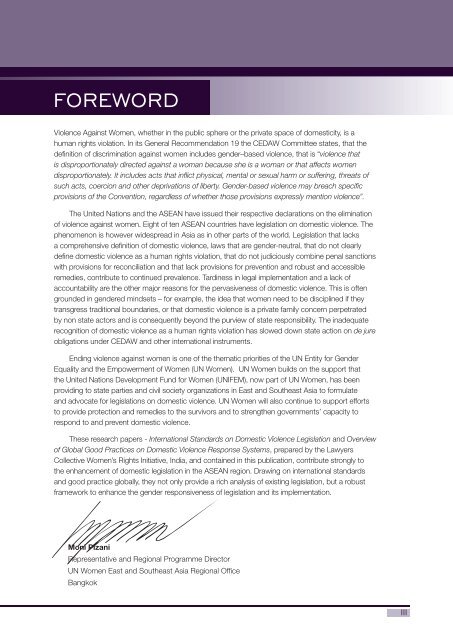Domestic Violence Legislation and its Implementation
Domestic Violence Legislation and its Implementation
Domestic Violence Legislation and its Implementation
You also want an ePaper? Increase the reach of your titles
YUMPU automatically turns print PDFs into web optimized ePapers that Google loves.
FOREWORD<br />
DOMESTIC VIOLENCE<br />
LEGISLATION AND ITS IMPLEMENTATION<br />
<strong>Violence</strong> Against Women, whether in the public sphere or the private space of domesticity, is a<br />
human rights violation. In <strong>its</strong> General Recommendation 19 the CEDAW Committee states, that the<br />
defi nition of discrimination against women includes gender–based violence, that is “violence that<br />
is disproportionately directed against a woman because she is a woman or that affects women<br />
disproportionately. It includes acts that infl ict physical, mental or sexual harm or suffering, threats of<br />
such acts, coercion <strong>and</strong> other deprivations of liberty. Gender-based violence may breach specifi c<br />
provisions of the Convention, regardless of whether those provisions expressly mention violence”.<br />
The United Nations <strong>and</strong> the ASEAN have issued their respective declarations on the elimination<br />
of violence against women. Eight of ten ASEAN countries have legislation on domestic violence. The<br />
phenomenon is however widespread in Asia as in other parts of the world. <strong>Legislation</strong> that lacks<br />
a comprehensive defi nition of domestic violence, laws that are gender-neutral, that do not clearly<br />
defi ne domestic violence as a human rights violation, that do not judiciously combine penal sanctions<br />
with provisions for reconciliation <strong>and</strong> that lack provisions for prevention <strong>and</strong> robust <strong>and</strong> accessible<br />
remedies, contribute to continued prevalence. Tardiness in legal implementation <strong>and</strong> a lack of<br />
accountability are the other major reasons for the pervasiveness of domestic violence. This is often<br />
grounded in gendered mindsets – for example, the idea that women need to be disciplined if they<br />
transgress traditional boundaries, or that domestic violence is a private family concern perpetrated<br />
by non state actors <strong>and</strong> is consequently beyond the purview of state responsibility. The inadequate<br />
recognition of domestic violence as a human rights violation has slowed down state action on de jure<br />
obligations under CEDAW <strong>and</strong> other international instruments.<br />
Ending violence against women is one of the thematic priorities of the UN Entity for Gender<br />
Equality <strong>and</strong> the Empowerment of Women (UN Women). UN Women builds on the support that<br />
the United Nations Development Fund for Women (UNIFEM), now part of UN Women, has been<br />
providing to state parties <strong>and</strong> civil society organizations in East <strong>and</strong> Southeast Asia to formulate<br />
<strong>and</strong> advocate for legislations on domestic violence. UN Women will also continue to support efforts<br />
to provide protection <strong>and</strong> remedies to the survivors <strong>and</strong> to strengthen governments’ capacity to<br />
respond to <strong>and</strong> prevent domestic violence.<br />
These research papers - International St<strong>and</strong>ards on <strong>Domestic</strong> <strong>Violence</strong> <strong>Legislation</strong> <strong>and</strong> Overview<br />
of Global Good Practices on <strong>Domestic</strong> <strong>Violence</strong> Response Systems, prepared by the Lawyers<br />
Collective Women’s Rights Initiative, India, <strong>and</strong> contained in this publication, contribute strongly to<br />
the enhancement of domestic legislation in the ASEAN region. Drawing on international st<strong>and</strong>ards<br />
<strong>and</strong> good practice globally, they not only provide a rich analysis of existing legislation, but a robust<br />
framework to enhance the gender responsiveness of legislation <strong>and</strong> <strong>its</strong> implementation.<br />
Moni Pizani<br />
Representative <strong>and</strong> Regional Programme Director<br />
UN Women East <strong>and</strong> Southeast Asia Regional Offi ce<br />
Bangkok<br />
III

















